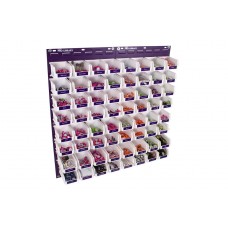Pro Library with wall Storage
This giant collection was built so inventors’ imaginations can go wild as they build the most advanced littleBits inventions. It includes complex Bits that bring programming, internet, music and logic into the mix. Get the creative juices flowing in your school, library, or makerspace!
What You'll Get
304 Bits & 228 Accessories

Arduino(4)
Easily incorporate programming into your inventions with Arduino.

Bargraph(4)
The bargraph is like an equalizer. Get an instant view of the signal going through.

Bend Sensor(4)
The bend sensor turns on as you flex the long strip.

Branch(4)
The branch Bit lets you connect the output of a single Bit to as many as 3 others.

Bright Led(4)
The bright LED (or light-emitting diode) is a small Bit that puts out a big light.

Button(4)
You've used a button before! This is a clicker, tact switch, etc...

Buzzer(4)
Bzzz! The buzzer is like the sound in an alarm clock: it makes a noise you just can't ignore.

Control Voltage (CV)
Integrate your littleBits circuits with other analog synthesizers.

DC Motor(4)
The DC motor rotates a shaft when you send it an ON signal. Attach wheels and more!

Delay(4)
The littleBits delay Bit takes incoming audio and repeats it, like an echo.

Dimmer(4)
The dimmer Bit lets you control your creations with a simple knob.

Double AND(4)
Double AND is a logic gate. It sends an ON signal when its 2 inputs receive an ON signal.

Double OR(4)
Double OR is a logic gate. The output is active if either of its 2 inputs is active.

Envelope(4)
The envelope modifies the loudness contour of a sound.

Fan(4)
The fan is just what you'd think: a small electric fan tethered to a Bit.

Filter(4)
The filter affects a note's timbre by changing the relative volume of certain frequencies.

Fork(4)
Connect one output to as many as 3 other Bits to trigger multiple actions at once.

Inverter(4)
Inverter is a very contrary logic Bit. It sends out the opposite of whatever it receives.

IR Led(4)
The IR LED Bit sends out light with longer wavelengths than visible light.

IR Transmitter(4)
Please note: This module is not available for individual sale yet, but you can find it in the...
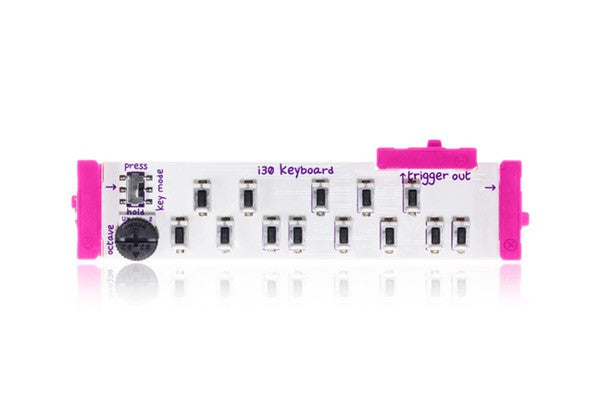
Keyboard(4)
The Keyboard features 13 switches that make an octave of notes so you can play melodies.

Latch(4)
Use the latch to turn any momentary input into an on-off switch, like a toggle!

LED(4)
The LED (or light-emitting diode) Bit is a very small board that shines a green light.

Light Sensor(4)
The light sensor measures how much light is shining on it. It has 2 modes: light & dark.

Light Wire(4)
The light blue light wire is about 4 feet long and can be bent, shaped, sewn, or stapled.
Long Led(4)
If you ever wanted an LED in a tiny little space, the long LED is your Bit!

Makey Makey(4)
Turn everyday objects into touchpads, or control your computer's cursor with this Bit.

Micro Sequencer(4)
The micro sequencer sends out voltages based on the position of each of the 4 knobs.

Microphone(4)
The microphone Bit translates sound into the electronic language of littleBits.

Midi(4)
Send and receive MIDI messages with the MIDI Bit.

Mix(4)
The mix Bit allows you to combine 2 inputs and send them to a single output.

Motion Trigger(4)
The motion trigger is a sensor that detects the slightest movement around it.

Mp3 Player(4)
The MP3 player allows you to play your very own MP3 files using littleBits.

NAND(4)
The NAND Bit is a logic gate with 2 inputs. Think of it as "not and."

NOR(4)
This logic gate sends an ON signal when neither of its 2 inputs is receiving a signal.

Number(4)
The number Bit displays information about the signal it’s receiving from other Bits.

Oscillator(4)
The oscillator creates audio tones that can be manipulated with its pitch nob and tune dial.

Perf(4)
The perf Bit is an easy way to prototype a circuit for the littleBits collection.

Power(16)
The power Bit lets you use a 9-volt battery to supply power to all your connected Bits.

Pressure Sensor(4)
The pressure sensor is a touch-activated Bit. Give its pad a squeeze to activate it!

Proto(4)
The proto Bit is what littleBits engineers use to build and prototype new Bits for you.

Pulse(4)
The pulse Bit is like an electronic heartbeat. It sends out a stream of short ON signals.

Random(4)
This Bit has two modes: “noise” (white noise) and “random voltage” that controls oscillators.
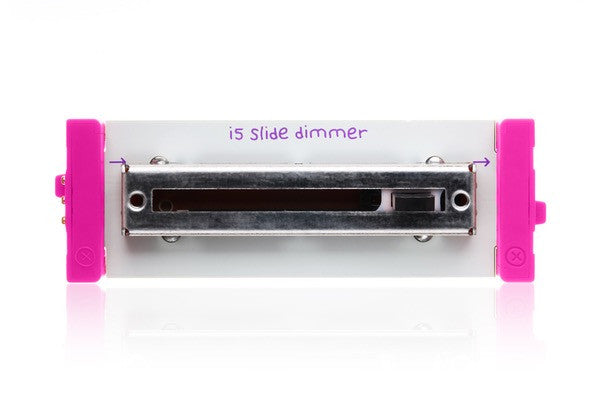
Remote Trigger(4)
The remote trigger lets you use a common remote control with your Bits.

RGB LED(4)
The RGB LED Bit is a special light whose color you can adjust.

Roller Switch(4)
This Bit has a little lever with a wheel, and activates when something pushes the roller in.

Sequencer(4)
This Bit lets you connect to up to 8 outputs and control them in sequential patterns.

Servo(4)
The servo is a controllable motor that can swing back and forth.

Slide Dimmer(4)
The slide dimmer is an analog input. Adjust it by moving its lever from side to side.

Slide Switch(4)
The slide switch is a small and convenient way to turn your creations on and off.

Sound Trigger(4)
The sound trigger sends an ON signal when the noise gets over a certain level.

Split(4)
The split Bit sends a single input to 2 wired outputs.

Synth Speaker4)
The synth speaker amplifies your sonic explorations.
Temperature Sensor(4)
The temperature sensor responds to the temperature surrounding its probe.

Threshold(4)
Think of the threshold as a toll booth for signal passing through your circuit.

Timeout(4)
The timeout Bit is a settable timer.

Toggleswitch(4)
The toggle switch is perfect for those inventions where you want a sturdy on-off switch

USB I/O(4)
The USB I/O Bit allows you to record digital audio directly into your computer.
USB Power(4)
Connect a USB cable to your computer or phone charger to start powering your inventions.

UV LED(4)
Make certain things glow in the dark with this Bit whose light looks purple to the eye.

Vibration Motor(4)
With the vibration motor Bit, you can make anything vibrate and buzz!

Wire(32)
The wire allows you to extend your circuits and put more space between two Bits.

Wireless Receiver (1 Channel)(4)
The wireless receiver Bit receives a signal from your wireless transmitter.

Wireless Transmitter (1 Channel)(4)
The wireless transmitter Bit sends a signal to your wireless receiver.

XOR(4)
The XOR Bit is a logic gate with 2 inputs. Think of it as "exclusive or."
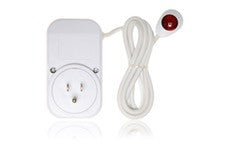
AC Switch(4)
Please note: This product is not available for individual sale yet, but you can find it in the...

Battery + Cable(16)
Connect it to your power Bit and then flip the switch to send juice to all of your creations!
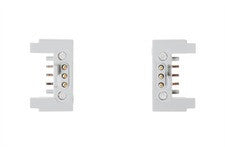
Bitsnaps(4)
bitSnaps are the color-coded, magnetic connectors found on all your Bits.

Brick Adapter(4)
The brick adapter enables you to easily snap your Bits to LEGO® bricks

Getting Started With Littlebits
Getting Started with littleBits is a comprehensive guide to littleBits.

Motormate(16)
This accessory helps you attach wheels, paper, and lots of other materials to the DC motor.

Mounting Boards(16)
Keep your circuit intact and move it around with ease with our mounting boards.

Screwdriver16)
This little purple screwdriver is used to modify any Bit with a micro adjuster (e.g. pulse, rgb...

Shoes(144)
Press shoes onto your circuit to keep it securely intact.
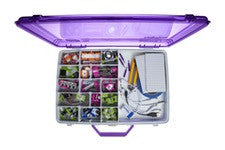
Tackle Box(3)
Perfect for stowing your Bits away in the workshop and at home, or taking on the go!
USB Power Adapter + Cable(4)
Connect a USB cable to your computer or phone charger to power your inventions.
Enter the code in the box below:
